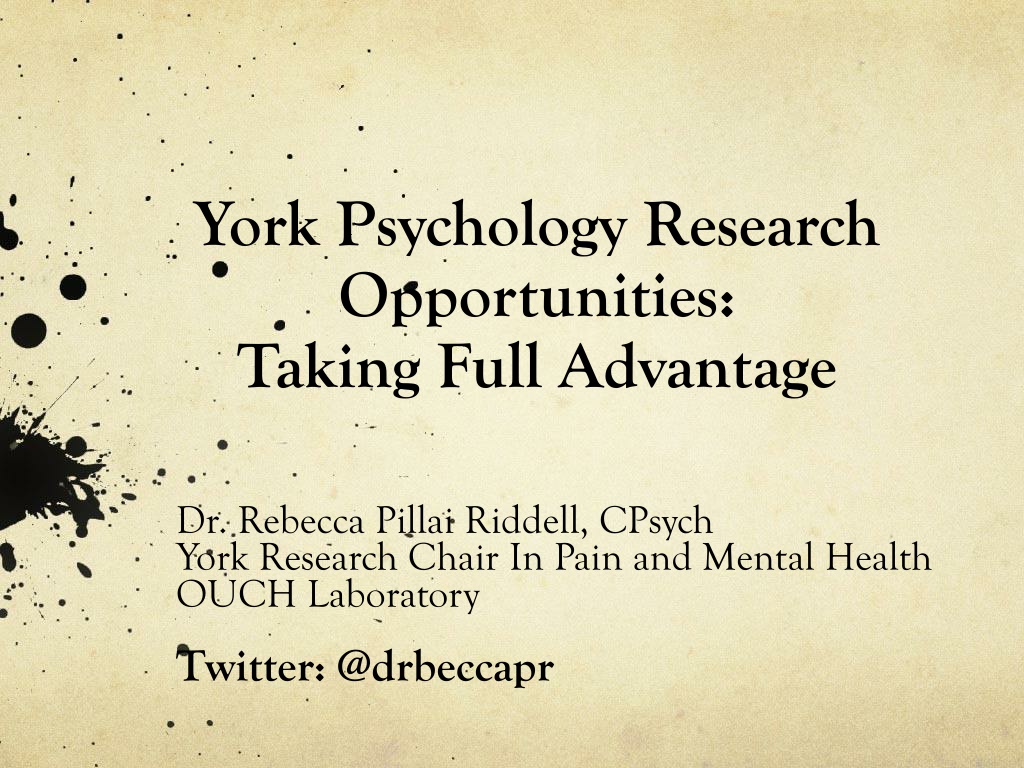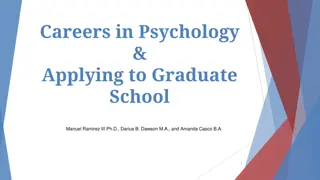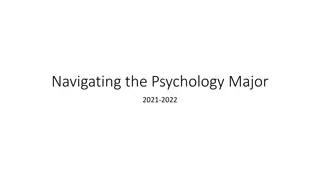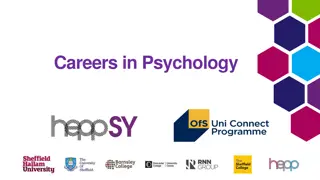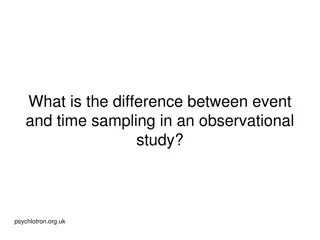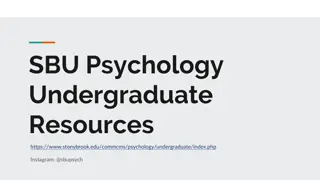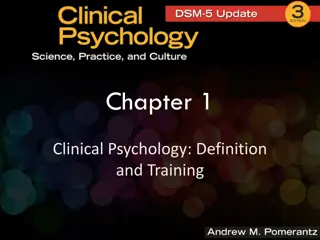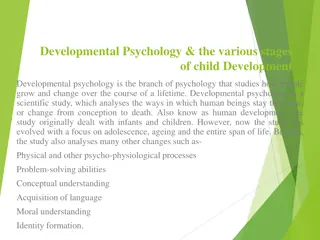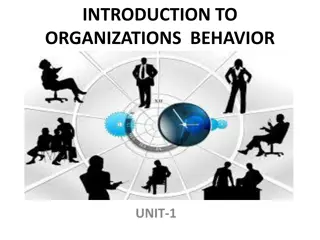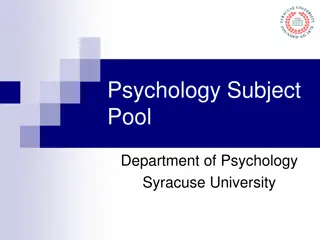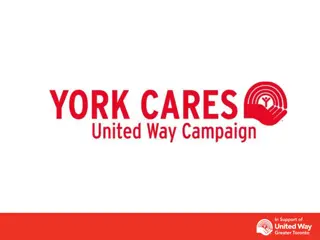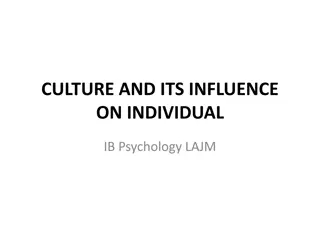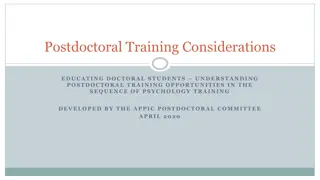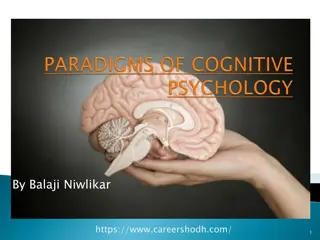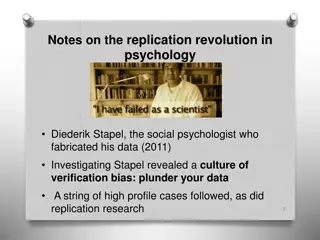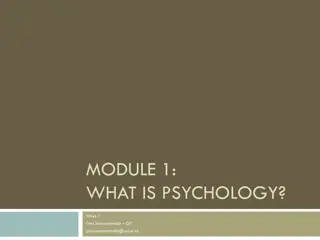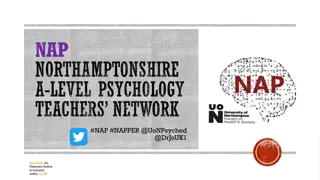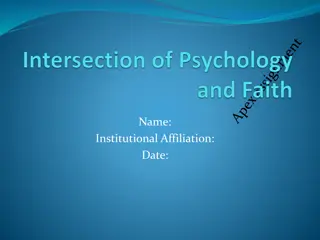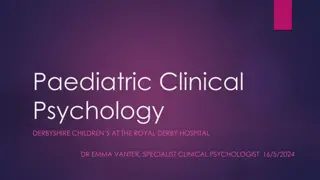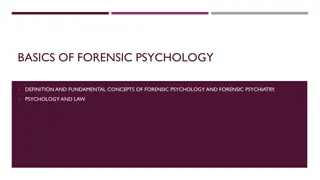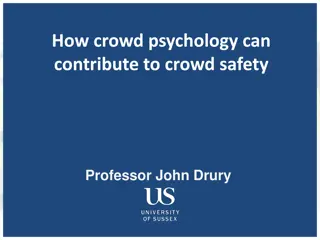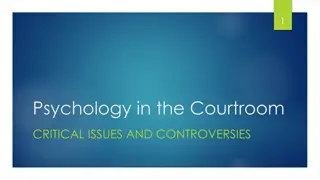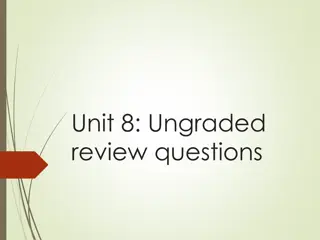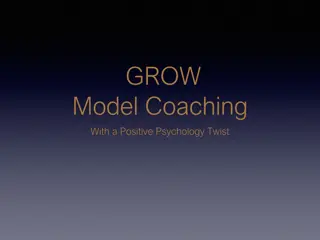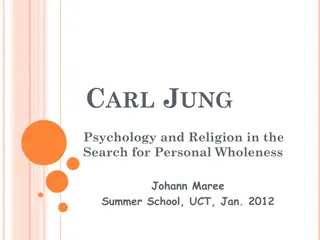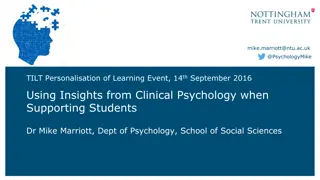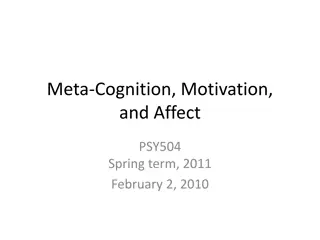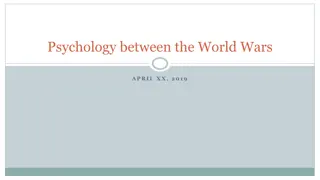Opportunities in Psychology Research at York University
York Psychology offers world-class research opportunities with a focus on various specialty areas including Quantitative Methods, Clinical Psychology, and Cognitive Science. Research volunteers engage in tasks like data entry, collection, and analysis, providing valuable experience for future opportunities in academia or professional fields. Getting involved in research is beneficial for students considering graduate school or seeking job readiness skills.
Download Presentation

Please find below an Image/Link to download the presentation.
The content on the website is provided AS IS for your information and personal use only. It may not be sold, licensed, or shared on other websites without obtaining consent from the author. Download presentation by click this link. If you encounter any issues during the download, it is possible that the publisher has removed the file from their server.
E N D
Presentation Transcript
York Psychology Research Opportunities: Taking Full Advantage Dr. Rebecca Pillai Riddell, CPsych York Research Chair In Pain and Mental Health OUCH Laboratory Twitter: @drbeccapr
York Psychology is World-Class Top 100 psychology department in the WORLD (only handful universities in Canada have similar ranking) 80+ Full-time Faculty Members Specialty areas such as Quantitative Methods and History and Theory of Psychology Both Adult and Child Clinical psychology programs Established Brain Behaviour and Cognitive Science, Developmental Science and Social/Personality programs
What do you do as a research volunteer? Why get involved in research volunteering? Who should be getting involved in research volunteering? When should you apply for research volunteering? Where should you apply for research volunteering?
What do you do as a research volunteer? It depends Data Entry Data Collection Data Analysis (rarely) Data Dissemination (rarely) Stepping stone to larger opportunities (paid position, independent study, honours thesis position)
Why Should Students Get Involved in Research? TO GO TO GRADUATE SCHOOL Need this experience to know if you like it and to get accepted into and take off in graduate school TO NOT GO TO GRADUATE SCHOOL Evidence-based practice (medicine, SL/P, law, social work) To get reference letters from a professor who can vouch for you Job readiness skills
TO GO TO GRADUATE SCHOOL If you plan to pursue a research-intensive graduate program and/or if you want to complete an individually supervised thesis, you should apply to be in the Specialized Honours program. As of Fall 2019, you will need to be in the Specialized Honours program to complete a thesis (PSYC 4001 Specialized Honours Thesis). The FW 2018-2019 academic year will be the last year that PSYC 4000 (Honours Thesis) and PSYC 4170 (Advanced Research Methods) will be offered.
Specialized Honours Degree The Specialized Honours Psychology Program is a 120-credit degree program designed for students who intend to pursue postgraduate studies in Psychology or a related discipline. Students who graduate from this program will have demonstrated knowledge in a breadth of subdisciplines within Psychology and will be able to critically evaluate research results, theories, and opinions within this field. In addition, students who graduate from this program will have specialist training in research methods, statistical analyses, scientific communication, and critical thinking. A requirement of this program is the completion of an Honour s thesis under the direct supervision of a Psychology faculty member. This program is well suited for students who plan to pursue postgraduate studies in a research-intensive field. Admission to the program is by Department permission. Please note you can only apply to the Specialized Honours Psychology Program between May 1 and May 15.
Honours Degree? The Honours in Psychology program is a 120-credit degree program designed for students who are interested in learning about and applying knowledge accumulated from the discipline of psychology. Students who graduate from this program will have demonstrated knowledge in a breadth of subdisciplines within Psychology, and will be able to critically evaluate research results, theories, and opinions within this field. Graduates of this program will be able to engage in quantitative reasoning through the interpretation of empirical results. Additionally, graduates will have demonstrated an appreciation of alternative methods used in psychological inquiry and will be able to synthesize potentially conflicting results and communicate these ideas to the general public. Students can also complete a Double Major or a Major/Minor option. This program is well suited for students who intend to enter the workforce following graduation and/or who may intend to pursue postgraduate studies in professional and applied related fields of psychology.
Specialized Honours Degree Must have CGPA of at least 7.0 (B+) in order to graduate with a Specialized Honours degree. Cannot complete a double-major or a minor (not possible with Specialized Honours) All students follow the new program requirements (see our website for more information. Ideal program if you are considering graduate studies in Psychology or a research intensive related field (you receive additional guidance and training about graduate school) and/or if you want to complete an individually supervised thesis. Need to find your thesis supervisor, but you will receive some guidance
Specialized Honours Degree Applications will be accepted between May 1stand May 15thof each academic year. You are eligible to apply for this program this year if you: Have completed (or will have completed by the end of the summer term) at least 54 credits, Have completed at least 12.0 credits of your General Education requirements Have at least a B+ (7.0 or higher) cumulative GPA Have completed (or will have completed by the end of the summer term) each of the following courses: Psychology 2020: Statistical Methods I and II (or equivalent) Psychology 2030: Introduction to Research Methods, Psychology 2010: Writing in Psychology at least 3.0 credits from Group 1 (2100 series) and at least 3.0 credits from Group 2 (2200 series)
The Undergrad Psychology Office 291 BSB Dr. J. Connolly, Undergraduate Program Director Dr. J Steele, Association Undergraduate Program Director Undergraduate Office staff provides advice about your psychology degree requirements advice about where to seek non-academic services help with PSYC courses enrolment, when necessary Scheduling advising appointments Call 416-736-5117 Email psyc@yorku.ca
Why do Professors Want Students To Volunteer in their Research? To train students who can be invested in their research in the long term To get support on studies in a challenged funding environment To learn and get new perspectives on their research ideas To get collaborators for graduate student researchers
Who should be applying to research volunteer positions? Students with a B+ GPA or higher Students who can dedicate 5-10 a week for a year Students who want to grow with a lab (volunteer to RA to thesis to gap year!) Students who can multi-task AND time manage Students who are interested in research
Who do professors want to hire in these positions? Independent, mature, organized, hard working, intelligent students who have skills needed in the lab and will benefit from the experience
WHEN For Summer term/Fall term but apply early At the end of a course you enjoy to approach a professor or a TA Keeping your eyes peeled to UPSA or Undergraduate Program emails about opportunities
WHERE TO GO? Developmental Science Social and Personality Quantitative Clinical/Clinical Developmental http://psyc.info.yorku.ca/ research/research- opportunities/ Rebecca Pillai Riddell (mid-Feb) Rob Muller Magdalena Wojtowicz Jennifer Mills (**PAID**; lab management, proofreading, data entry) History and Theory BBCS Joseph DeSouza Ingo Fruend
Top 5 Things to DO Ask yourself first: Can I do 5-10 hours a week for a year? GRADES first, research second 1. Throughly read the website and a few abstracts/online articles of profs you are interested in. 2. Submit a specific cover letter, unofficial transcripts and resume. 3. Write a professional email to go along with your attachments. Mention you can send any additional information they would require. 4. Follow up politely within 3 weeks 5.
Top 5 Things NOT to do Volunteer in more than 2 labs concurrently Blanket every prof with a request to do research Approach professors in person as first point of contact Overload yourself with volunteer commitments Allow your grades to slip
Advice from your peeps Grateful to 10 undergrads in the OUCH lab who offered advice for this talk: Attend lab meetings Join a lab early on in your career and stick to a few labs Have a cover letter that highlights your marketable skills (attention to detail, knowing Excel, Powerpoint, SPSS, R, high grades, particular courses) Be a respectful, professional worker- impression management (eager, diligent, hard-working, positive, reliable) Appreciate every opportunity- They are doing you a favour not vice-versa! Bond with other students in the lab find out the range of opportunities available Don t give up looking!!
